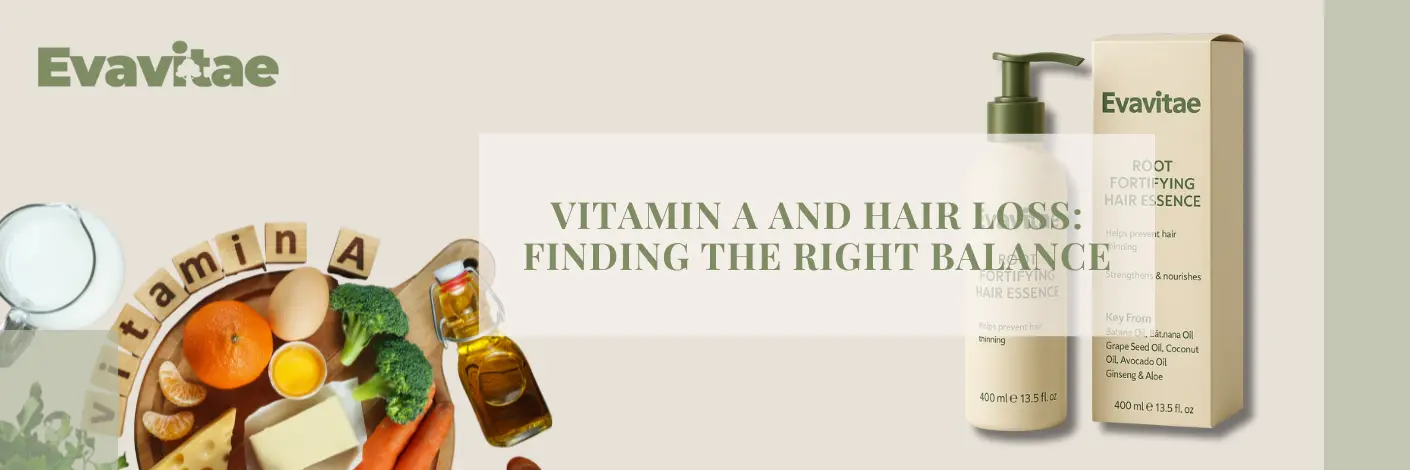
Hair health often reflects our overall nutritional status, and one nutrient that plays a surprisingly complex role in hair growth is vitamin A. While this essential fat-soluble vitamin supports cell growth and scalp health, both too little and too much can lead to hair loss. Understanding how vitamin A affects the hair cycle can help you find the right balance for optimal scalp and follicle health.
What Is Vitamin A and Why Do We Need It?
Vitamin A is a group of compounds including retinol, retinal, and retinoic acid, along with provitamin A carotenoids such as beta-carotene. It plays a role in:
- Cell growth and differentiation – Essential for healthy skin, including the scalp.
- Sebum production – Helps maintain a moisturized scalp environment.
- Immune function – Supports the body’s ability to fight scalp infections and inflammation.
The Recommended Dietary Allowance (RDA) for adults is approximately 900 mcg/day for men and 700 mcg/day for women (National Institutes of Health [NIH], 2022).
Vitamin A is just one of many nutrients that can affect the hair growth cycle. For a broader overview of how multiple deficiencies contribute to shedding, check out what deficiency causes hair loss and how to restore balance from within.
How Vitamin A Deficiency Can Cause Hair Loss
A lack of vitamin A can negatively affect hair growth in several ways:
1.Disrupted Cell Turnover
Hair follicles are among the fastest-growing tissues in the body. Without sufficient vitamin A, cell renewal slows down, making hair shafts weaker and more prone to breakage.
2.Dry, Flaky Scalp
Vitamin A regulates sebum production. Deficiency may lead to dryness and scaling, creating an unhealthy environment for hair growth.
3.Weakened Immune Response
A vitamin A shortage can reduce the scalp’s defense against microbial overgrowth, increasing the risk of inflammatory scalp conditions that contribute to hair shedding.
While true deficiency is uncommon in developed countries, it can occur with restrictive diets, fat malabsorption disorders, or prolonged lack of nutrient-rich foods.
Beyond vitamins, external care products also play an important role in preventing and managing hair loss. Learn how formulations differ in our comparison of hair loss shampoos for women vs men and which approach best fits your scalp needs.
How Too Much Vitamin A Can Cause Hair Loss
Ironically, excessive vitamin A intake is a well-documented cause of hair loss. This is because high levels can disrupt the normal hair cycle and trigger telogen effluvium, a condition where hair prematurely enters the resting (telogen) phase.
Common causes of vitamin A toxicity include:
- Overuse of high-dose supplements
- Certain acne medications (e.g., isotretinoin, which is a derivative of vitamin A)
- Excessive intake of animal liver or fortified foods
Symptoms of vitamin A toxicity may include:
- Dry, brittle hair
- Peeling skin
- Headaches and dizziness
- Joint pain
- Diffuse hair shedding
A study published in the American Journal of Clinical Nutrition found that individuals with chronic hypervitaminosis A experienced significantly higher rates of hair loss compared to those with normal intake (Hathcock et al., 1990).
Vitamin A is only one part of the bigger picture — other nutrient imbalances can also impact hair growth. To learn more, read our in-depth guide on vitamin deficiency and hair loss and what your hair might be telling you.
Real-World Hair Recovery: What to Expect
With consistent gentle care:
- Itching and flakiness may reduce within 1–2 weeks
- Visible shedding often decreases within 4–6 weeks
- Hair regrowth can resume after a 3-month maintenance period
For persistent or painful flare-ups, consult a dermatologist for combined treatments—including light therapy or longer-term topical care.
The Science Behind Vitamin A and the Hair Cycle
Vitamin A influences hair follicles primarily through its role in cellular differentiation and gene expression. Retinoic acid, the active form of vitamin A, binds to nuclear receptors that regulate genes involved in follicle development. In proper amounts, it promotes healthy anagen (growth) phase activity.
However, excessive stimulation can accelerate follicle cycling, shortening the growth phase and leading to shedding. This explains why balance is critical.
How to Maintain Optimal Vitamin A Levels
- Get Vitamin A from Whole Foods First
Natural sources provide a safer balance of active vitamin A and provitamin A carotenoids, which the body converts as needed.
- Animal sources (preformed vitamin A): liver, dairy products, eggs
- Plant sources (beta-carotene): sweet potatoes, carrots, spinach, kale
- Be Cautious with Supplements
If you take a multivitamin, check the label. Many already provide 100% of the RDA, and exceeding it unnecessarily can increase toxicity risk.
- Work with a Healthcare Professional
If you suspect your hair loss may be nutrition-related, request a blood test to assess vitamin A status before starting any supplementation.
Who Is Most at Risk of Vitamin A Imbalance?
- Deficiency risk:
- People with gastrointestinal disorders (e.g., celiac disease, Crohn’s disease)
- Individuals on extremely low-fat diets
- People with chronic alcohol use disorder
- Excess risk:
- Those taking multiple vitamin supplements or high-dose retinoid medications
- Individuals consuming large amounts of organ meats
Vitamin A in the Context of Overall Hair Health
While vitamin A plays a critical role, it’s just one piece of the hair health puzzle. Nutrients like vitamin D, biotin, iron, and zinc are also essential. A varied, nutrient-dense diet is more effective for hair health than focusing on one vitamin alone.
For more on hair nutrition and balanced supplementation, see the Harvard T.H. Chan School of Public Health’s micronutrient guide.
When to Seek Medical Advice
If you notice sudden or excessive hair shedding, it’s important to consider multiple factors:
- Nutritional imbalances
- Hormonal changes
- Stress levels
- Scalp conditions
A dermatologist or trichologist can help identify the root cause and guide safe vitamin A adjustments.
Key Takeaways
- Too little vitamin A → weak hair structure, dry scalp, slowed growth.
- Too much vitamin A → triggers hair shedding and scalp dryness.
- Safe range: Meet but do not significantly exceed the RDA unless under medical supervision.
- Focus on food sources first, and only supplement when necessary.
Balanced vitamin A intake is essential for maintaining healthy hair growth without tipping the scales toward hair loss. By keeping levels in check, you can support your hair and scalp health for the long term.
For optimal results, pairing your supplements with a gentle, non-irritating shampoo will improve your results. I recommend Evavitae shampoo. Checking its ingredient list reveals its natural and healthy ingredients. If you’re willing to invest more time in your hair care routine, you can also try its set.
Learn how to stop shedding and encourage growth naturally in our Postpartum Hair Regrowth Guide.
📚 References (APA Format)
Hathcock, J. N., Hattan, D. G., Jenkins, M. Y., McDonald, J. T., Sundaresan, P. R., & Wilkening, V. L. (1990). Evaluation of vitamin A toxicity. American Journal of Clinical Nutrition, 52(2), 183–202. https://doi.org/10.1093/ajcn/52.2.183
National Institutes of Health. (2022). Vitamin A fact sheet for health professionals. Retrieved from https://ods.od.nih.gov/factsheets/VitaminA-HealthProfessional/
Evavitae products are now available exclusively at www.evavitae.com.




Add comment
You must be logged in to post a comment.